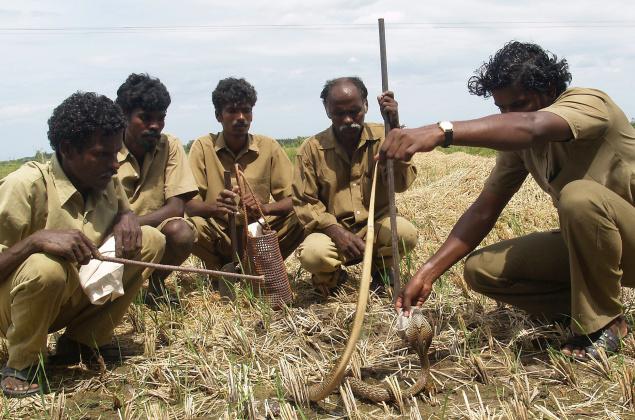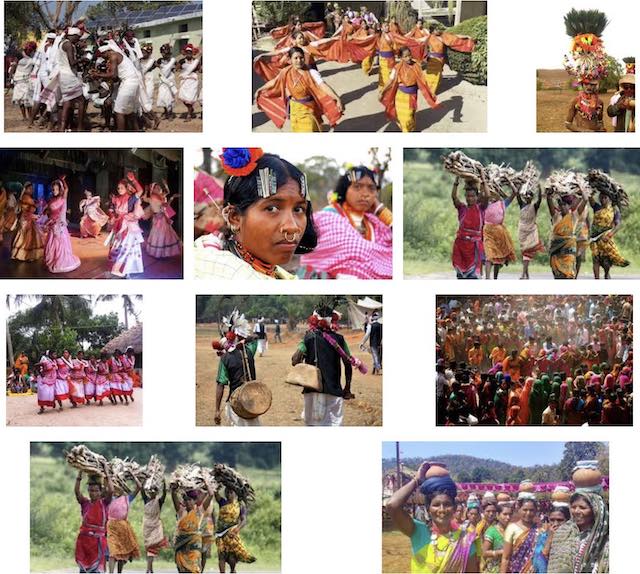“My grandmother told me if someone ever pointed out our dance movements are peculiar, we should tell them these are the feline steps of a hunter” | To read the full story, click here >>
Swarnalatha belongs to the tribal Irula community, known for their snake-catching skills. “We are so much more than that. We follow a tradition rich in music, dance and love,” said Swarnalatha, who now runs an NGO that works for the upliftment for people in her community.
Swarnalatha is among a group of Irulas and academicians who had gathered to celebrate the launch of a book documenting the lives of these tribals in the plains. The book is a collection of observations made by students and outreach workers associated with Loyola Institute of Social Science Training and Research of Irulas who live in Tindivanam, Tiruvannamalai, Tiruvallur and Kanchipuram.
Irula (people of darkness) inhabit mostly in the northern TN districts and some parts of Kerala. Researches have shown that the tribe have their origin from ethnic groups of Southeast Asia and Australia. They speak Irula language that is closely related to Dravidian languages like Tamil and Kannada.
Manjula C, a scholar on Irulas, said although a lot has been documented on the tribal community in the hills, there have been hardly any records on those who live in the plains. “Both the groups are completely different. They don’t even speak the same language,” she said. Nature, she said, features in all aspects of their lives, in the songs they sing, the medicinal herbs they take and the goddess (that are often made of mud) they worship.
Speakers at the event urged the government to do more for members of this community, who are often trapped into bondage by rice mills and brick kiln owners.
Source: ‘Irulas much more than a community of snake catchers’
URL: https://timesofindia.indiatimes.com/city/chennai/irulas-much-more-than-a-community-of-snake-catchers/articleshow/63035204.cms
Date visited: 17 January 2022
[Bold typeface added above for emphasis]
“Many brick workers in India are trapped in a cycle of debt-bondage, forced to toil in harsh conditions with little recourse to the law. Anti-Slavery has recently concluded a successful project on this issue. Working with our partners, we supported improvements in working conditions at 31 brick factories and secured the release of 2,251 workers from debt bondage.” | Learn more >>

Human trafficking is a crime. To report in India, call Shakti Vahini
+91-11-42244224, +91-9582909025 or the national helpline Childline on 1098.
National Programme for Child Labour Free India | PDF-Repository (70 KB) >>
“As per a study on human trafficking, the state of Jharkhand has emerged as India’s trafficking hub with thousands of tribal women and girls being trafficked out of the state each year to Delhi, Punjab, Haryana and beyond [while] human traffickers are also involved in many cases of missing children.” – The Wire | Shakti Vahini | Tourism locations | Adivasi tribal bondage slavery trafficking (Safe search) >>
Video | Dungri Latar (At the foothills): In quest of “a life beyond the world of quarry” >>
Irulas are very knowledgeable about medicinal plants. We buy raw materials from them that are used in making herbal products. Their children now go to schools and the drop-out is zero. We are integrating them into mainstream colleges and institutions. | Watch a video and read the full interview with author and nature lover Zai Whitaker >>

Photo credit: M. Karunakaran © The Hindu >>
Learn more about the Irula community & Snake >>
Up-to-date reports by Indian experts and journalists
Search tips
Combine the name of any particular state, language or region with that of any tribal (Adivasi) community.
Add keywords of special interest (music, poetry, dance just as health, sacred grove and biodiversity); learn about the rights of Scheduled Tribes such as the “Forest Rights Act” (FRA); and the United Nations “Declaration on the Rights of Indigenous Peoples”, “Universal Declaration of Human Rights”, “women’s rights”, or “children’s right to education”.
Ask a question that includes “tribal” or “Adivasi”, for instance: “Adivasi way of life better?” (or “tribal way of life worse?”)
Specify any particular issue or news item (biodiversity, bonded labour and human trafficking, climate change, ecology, economic development, ethnobotany, ethnomedicine, global warming, hunter-gatherers in a particular region or state, prevention of rural poverty, water access).
For official figures include “scheduled tribe ST” along with a union state or region: e.g. “Chhattisgarh ST community”, “Himalayan tribe”, “Scheduled tribe Tamil Nadu census”, “ST Kerala census”, “Particularly Vulnerable Tribal Group Jharkhand”, “PVTG Rajasthan”, “Adivasi ST Kerala”, “Adibasi ST West Bengal” etc.
In case the Google Custom Search window is not displayed here try the following: (1) toggle between “Reader” and regular viewing; (2) in your browser’s Security settings select “Enable JavaScript” | More tips >>
Note: hyperlinks and quotes are meant for fact-checking and information purposes only | Disclaimer >>
List of websites covered by this Google custom search engine
Academia.edu (platform for academics to share research papers) – www.academia.edu
Archive.org – https://archive.org
Centre for Science and Environment – https://www.cseindia.org
Current Conservation – https://www.currentconservation.org
Development and Cooperation (D+C) https://www.dandc.eu
Down To Earth (India) – www.downtoearth.org.in
India Environment Portal – www.indiaenvironmentportal.org.in
Harnessing Nature Magazine – https://harnessingnature.online
Mongabay-India – https://india.mongabay.com
M S Swaminathan Research Foundation – www.mssrf.org
Navdanya (protecting India’s biodiversity based food heritage) – https://navdanya.org
Third World Network (Penang, Malaysia) – https://twn.my
The Shola Trust (nature conservation in the Nilgiri region) – www.thesholatrust.org

Indian online periodicals and platforms | Images view >>
~ ~ ~
Personalize your CustomSearch by combining other search words >>
(e.g. name of a tribal community and region, a craft, or dance and puppetry)
Research the above issues with the help of Shodhganga: A reservoir of theses from universities all over India, made available under Open Access >>
Note: hyperlinks and quotes are meant for fact-checking and information purposes only | Disclaimer >>

Learn more
Atree.org | Ashoka Trust for Research in Ecology & the Environment (posts)
Biodiversity | Hyderabad biodiversity pledge | Nilgiri Biosphere
Climate change | Audio | The Climate Question (BBC Podcast)
eJournals & eBooks | Background guide for education
eLearning: Center for World Indigenous Studies
Forest Rights Act (FRA) | Hunter-gatherers | Legal rights over forest land
Health and nutrition | Recommendations by the Expert Committee
“The tribal food basket has always been diverse and nutritious”
United Nations on climate change
What is the Forest Rights Act about?
Who is a forest dweller under this law, and who gets rights?